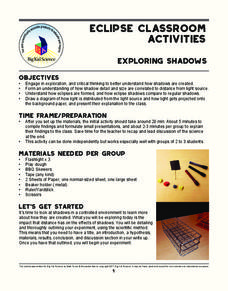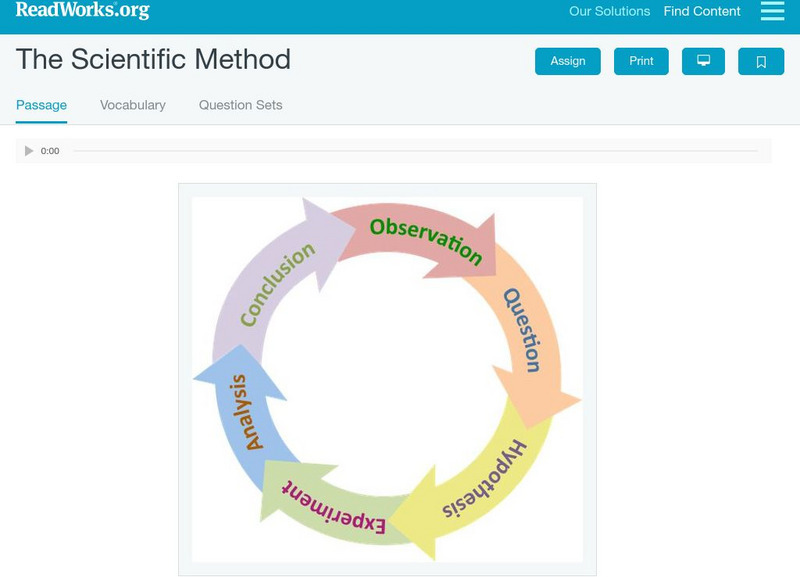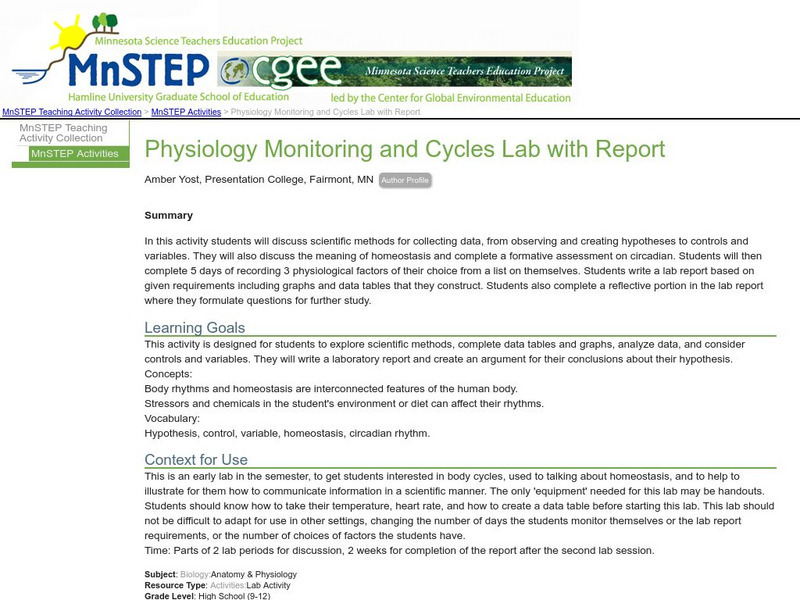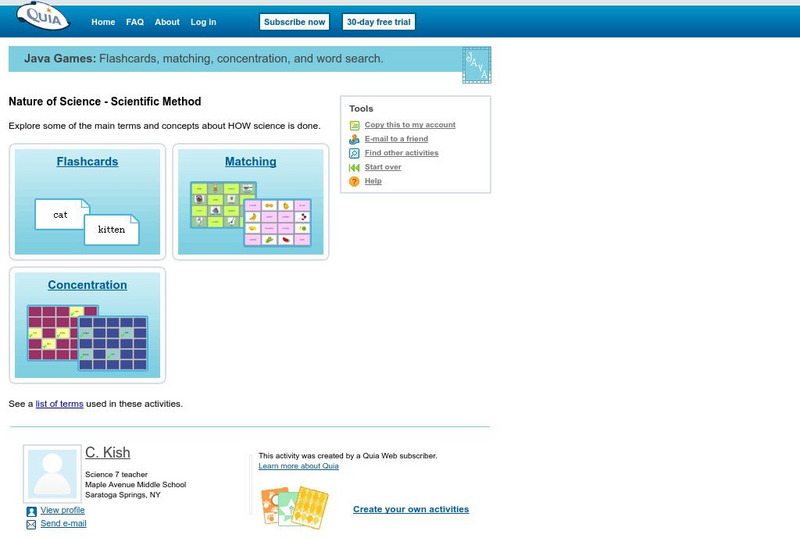Perkins School for the Blind
Introduction to Scientific Inquiry
Every great scientist knows that the process of inquiry is a very important skill. Provide your learners with visual impairments with an opportunity to explore objects scientifically. They examine several pieces of fruit and generate...
PBS
Predicting/Making a Hypothesis
As an introduction to the hypothesis and testing method of investigation, young history detectives engage in a special investigation of a family artifact. After watching a short video that demonstrates the method, they develop a...
Howard Hughes Medical Institute
Gorongosa: Scientific Inquiry and Data Analysis
How does the scientific process begin? Introduce ecology scholars to scientific inquiry through an insightful, data-driven lesson. Partners examine data from an ongoing research study to determine the questions it answers. The resource...
Howard Hughes Medical Institute
Testing a Hypothesis
Are sickle cell disease and malaria related somehow? Scholars learn about both illnesses and the hypotheses that they are related. They discuss, view a video, and answer questions to demonstrate understanding. The resource includes an...
American Psychological Association
Do Cookies/Donuts Improve Memory? Errors in Methodology
If the methodology is skewed, the results will be skewed. That's the takeaway from an exercise designed to get class members thinking about research methods and statistics gathering. Instructors manipulate the testing environment to...
Serendip
Carbohydrate Consumption, Athletic Performance and Health – Using Science Process Skills to Understand the Evidence
Should athletes carb load before an event or consume carbohydrates during the competition? Scholars discuss how to set up a hypothesis and experiment to answer a question relating carbohydrates and athletic performance. Then, they read...
Howard Hughes Medical Institute
Scientific Inquiry Using WildCam Gorongosa
How do scientists determine what questions to ask to meet their research goals? Help your class develop an inquiry mindset with a lesson based on studies in the Gorongosa National Park. Partners create their own research questions by...
Howard Hughes Medical Institute
Fact Patterns: A Film Guide
What does it take to create a scientific theory? Learners attempt to answer the question by studying the work of Charles Darwin and Alfred Russel Wallace. While watching a video, they track observations from each scientist and then look...
Big Kid Science
Exploring Shadows
What's that lurking in the shadows? An activity that demonstrates how eclipses happen. Science scholars investigate how light and distance interact to form shadows. The experiment uses simple materials to generate data and observations...
Texas State Energy Conservation Office
Investigation: Kinetic and Potential Energy
A well-developed lab sheet guides physical science learners through an investigation of kinetic and potential energy. In small groups, collaborators discover whether or not the ramp height or mass of an object has an effect on the...
Science Matters
Spaghetti Fault Model
Does increasing the pressure between two moving plates provide a stabilizing force or create more destruction? The hands-on lesson encourages exploration of strike-split fault models. The sixth lesson in a 20-part series asks...
American Psychological Association
A Tasty Sample(r): Teaching about Sampling Using M&M’s
Here's a sweet activity! As part of a study of psychological research methods and statistic gathering, individuals develop a hypothesis about the number of each color of M&Ms in a fun-size package. They then count the number of each...
Integrated Physics and Chemistry
Law of Conservation of Matter
Does mass change during a chemical reaction? Demonstrate the Law of Conservation of Matter while encouraging class members to be creative with a two-part lesson. First, learners use Alka-Seltzer® tablets and water to demonstrate the...
New Mexico State University
Lab 6: Kepler's Laws
A 15-page package thoroughly teaches your physics or astronomy learners about Kepler's three laws of planetary motion. Each one is stated and explained. Class members answer questions, solve problems, and participate in the classic...
Read Works
Read Works: The Scientific Method
[Free Registration/Login Required] An informational text explaining the five steps of the scientific method. A question sheet is available to help students build skills in reading comprehension.
CK-12 Foundation
Ck 12: Scientific Inquiry
[Free Registration/Login may be required to access all resource tools.] Tutorial provides an understanding of the scientific method and how it is used to study the world around us. Students will learn about scientific inquiry and be able...
Science Buddies
Science Buddies: Scientific Method Conclusion
The conclusion of a science experiment summarizes how your results supported or contradicted your hypothesis. See a sample of a conclusion and find out what makes a good conclusion.
National Geographic
National Geographic: Round and Round With Simple Motors
After developing a hypothesis on how a motor works, students investigate this by building a simple electric motor, using the scientific method as they proceed. Includes handouts and worksheets, as well as a vocabulary list with...
National Center for Ecological Analysis and Synthesis, University of California Santa Barbara
Kids Do Ecology: Data and Science
Learn about conducting your own investigation with these tips on following the scientific method. Find out how to state hypothesis, make observations, collect and analyze data, and display data to share results and conclusions of your...
Science Education Resource Center at Carleton College
Serc: Physiology Monitoring and Cycles Lab With Report
Using physiology monitoring, students will understand how to collect data using scientific methods in this activity. Students will also learn how to communicate the finding in a lab report. Physiology monitoring will include measuring...
Quia
Quia: Nature of Science
Find games and flashcards that students can use to learn the words associated with the scientific method.
PBS
Pbs: Eggs Plore Science by Making Meringues
Practice the scientific steps of making predictions, observations, and discoveries while making this simple meringue recipe.
PBS
Pbs Teachers: Boats Afloat Experiment
Estimate how many pennies a flatboat made of aluminum foil will hold, then test your hypothesis.
Hunkins Experiments
Hunkin's Experiments
This amazing website provides access to 200 exciting experiments from cartoonist, broadcaster, and engineer, Tim Hunkin. Each experiment is categorized and illustrated.























